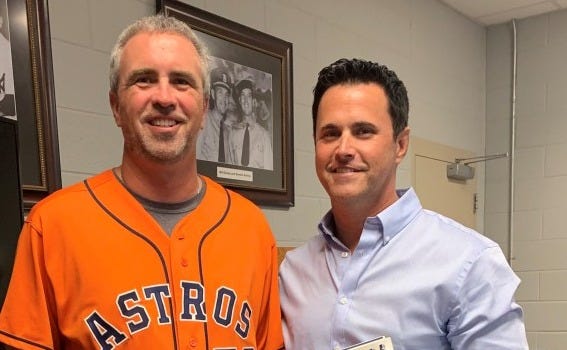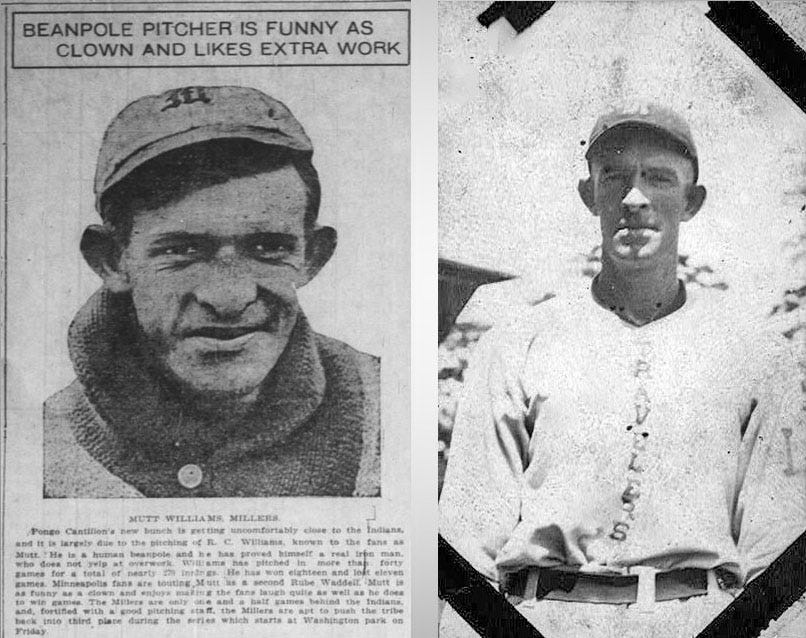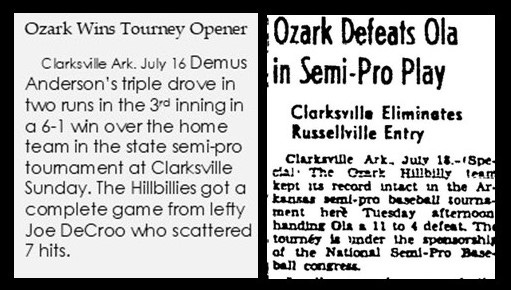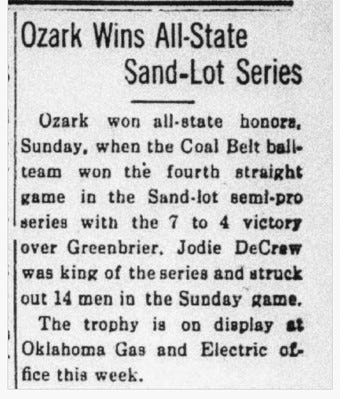Backroads and Ballplayers #80
Stories of the famous and not-so-famous men and women from a time when baseball was "Arkansas' Game." Backroads and Ballplayers Weekly is always free and short enough to finish in one cup of coffee.
Ozark Wins State Semi-pro Title, The Lost Story of Mutt Williams Incredible Season, and Madison McEntire Pens Albert Pujols Bio

Big News from the Robinson-Kell Chapter of SABR
The Baseball BioProject is one of the signature publications of the Society for American Baseball Research.
According to SABR: “The project is an ongoing effort to research and write comprehensive biographical articles on people who played or managed in the major leagues. With over 6,000 (and counting) biographies contributed by SABR members, the ambitious goal of the BioProject is to publish a full-life biography of every major league player in history.”
Being chosen to author one of these bios is one of the most significant honors an SABR member can achieve. A SABR BioProject entry creates a piece of baseball history that will be read by thousands of baseball fans around the world.

This month we at the Robinson-Kell Chapter of SABR are proud to announce that our president, Madison McEntire’s, Bio-Project of Albert Pujols has gone live on the SABR website. Imagine the number of readers for the biography of one of modern baseball’s most popular players. Congratulations Madison on a job well done!
Albert Pujols SABR BioProject Albert Pujols
________________________________________
I can’t believe I am opening a baseball history column by stealing a line from Junior Samples. If you remember Junior Samples, that little bit of 1970s trivia knowledge will not place you in a category of intellectually elite folks.
Backroads and Ballplayers Weekly salutes my hometown Ozark, Arkansas, population 3,542. Ozark is the birthplace of exactly one major league baseball player and the proud owner of one state semi-pro title.
It seems to be popular these days to say something like, “I could not wait to get away from my small hometown.” In my case, I think I was blessed to grow up in a beautiful little town with special people who know that Ozark Hillbilly should be capitalized. I will always be proud to be from Ozark, Arkansas.
Ozark is a baseball town. Most of our grandparents were St. Louis Cardinals fans, and many of them have “grandpa stories” about batting against Preacher Roe, meeting Dizzy Dean, or seeing Stan Musial play. One of those handed-down tales is the story of the year Ozark won the semi-pro state championship.
Arkansas State Semi-pro Champions 1939
No Sponsor in Sight
It was 1939, the third year the state had crowned an official Arkansas Champion of Semi-pro Baseball. The Ozark town team that entered the state semi-pro baseball tournament called themselves the Hillbillies, although the town team in the Coal Belt League was known in newspapers as the Redbirds.
The first two Arkansas state titleholders had been sponsored by a large lumber company and a research hospital. Ozark had a very competitive town team, but a sponsor with the kind of deep pockets necessary to field a well-equipped team and perhaps pay a pitcher did not exist in an Ozark Mountain town of about 1400.
Ozark’s answer was for the town to sponsor the team collectively. Merchants and citizens would chip in what they could, and pledges would be collected on a weekly or monthly basis. According to the Ozark Spectator, more than 100 individuals and businesses pledged a weekly donation. Most contributed 25 cents and a few gave as much as 50 cents. The Model Cafe and Vernon McDaniel were among the few whose pledge was more than one dollar.
Adding an All-American Pitcher
In 1937, the first year an Arkansas representative participated in the National Baseball Congress National Tournament, Charleston was selected as an at-large team to join the state champion Bierne Lumbermen at the Wichita, Kansas, event. After two outstanding outings in the tournament, Charleston pitcher, Joe DeCroo was named to the 1937 NBC Semi-pro All-America Team.
DeCroo was a diminutive left-hander with a good fastball and a “wicked curve.” He grew up around the small town of Bonanza in the coal mining region of Sebastian County, Arkansas. After the Semi-pro All-American attention earned DeCroo a minor league season in 1938, Ozark recruited him back into semi-pro baseball for 1939.
1939 Arkansas Semi-pro State Tournament, Clarksville, Arkansas
The tournament opened on Sunday, July 16, at Clarksville City Park. Dr. Earl Williams the commissioner of the state semi-pro association was in charge, and the baseball leader known as “Dr. Baseball” had two teams entered from his baseball school in Greenbrier. Greenbrier #1 featured six future pro players including Osceola’s Bill Ramsey who would play more than 1,000 professional games including 78 games for the Boston Red Sox.
Ozark won Game One on a seven-hit complete game by Joe DeCroo. After trailing 1-0, the Hillbillies scored three runs in the third inning on three singles and a triple by Demus Anderson. DeCroo didn’t allow a run after the first inning in a 6-1 Ozark victory.
The Hillbillies cruised to an 11-4 win the Game Two on Tuesday, and crushed Little Rock Kroger 15-2 in Game Three on Thursday. The Ozark team could rest until the weekend to meet the losers bracket winner in the finals. Local attorney Jack Yates was the star of the Thursday game with two singles and a home run.
DeCroo had pitched two complete games for Ozark, but after three days rest, he was ready for the finals on Sunday, July 23, against the experienced Greenbrier #1 team. Ozark was cruising toward an easy victory when DeCroo loaded the bases in the ninth. With the tying run on first, former minor league infielder Gene Williams filed out to left field. Ozark had their state title. Ray Hopkins and Boots Lessley had two hits each for the State Champion Hillbillies.
With increased interest in the national tournament creating more competition for spots in the Wichita national finals, Ozark would have to meet Branson, Missouri, in a best-of-five series for the place on the national tourney bracket. After Ozark won Game One, Branson won three consecutive games to end the Hillbillies’ national tournament run.
1939 Arkansas State Semi-pro Champions

One final thought…What if the trophy mentioned below still exists in the corner of a forgotten closet in Ozark, Arkansas?
The Lost Story of Ozark, Arkansas, Davis Carter Williams Amazing Season
Remember “complete games.” Major League Baseball quietly broke an all-time record for the fewest complete games in a season in 2024. (26) How about “innings pitched”? I am sure you can name the four pitchers who pitched more than 200 innings in 2024 Of course, they were Logan Gilbert, Seth Lugo, Logan Webb, and Zach Wheeler. By the way, the innings-pitched leader for the World Series Champions was Arkansas’ Gavin Stone. (Riverside High School, UCA)

The last season a big-league pitcher worked 300 innings was 1979, when Steve Carlton threw 304 innings; making him the most recent pitcher to achieve this feat in Major League Baseball.
Davis Carter “Mutt” Williams of Ozark, Arkansas, worked 440 2/3 innings in 1915 pitching for the Minneapolis Millers at minor league baseball’s highest level. He had a five-game shot in the majors the previous season and Mutt needed to make an impression on the Washington Senators who owned his contract. The plan apparently did not work. He never pitched another game in the big leagues.
In that remarkable season in Minnesota, Williams posted a 29-16 record. His 2.53 ERA was second on the Millers, but more remarkable were his 64 appearances on the mound and his over 440 innings pitched.
The headlines after Mutt won the pennant-clinching game lauded him as the “master pitcher with the iron arm.” Mutt Williams had pitched five times in the final seven days, as Minneapolis held off neighboring St. Paul to win the pennant by one game.
In a sport that depends on its numbers for context, Mutt Williams’ 1915 record represents a statistically staggering season. He appeared in 42% of the Millers’ games and averaged nearly seven innings per appearance. His 440-plus innings were the equivalent of 49 complete games. In today’s pitch-count-conscious game, totals approaching Williams’ marks are likely unobtainable, and innings-pitched totals approaching 400 are unimaginable. No major league pitcher has pitched 400 innings in a season in more than 100 years.
Next week I will make room for a more complete biography of this colorful and eccentric big league pitcher. Mutt Williams remains the only major league player born in my hometown.
Book ordering: Click this link for more information: Link
Welcome new subscribers. Have you missed some posts? Link - https://jyeager.substack.com/








